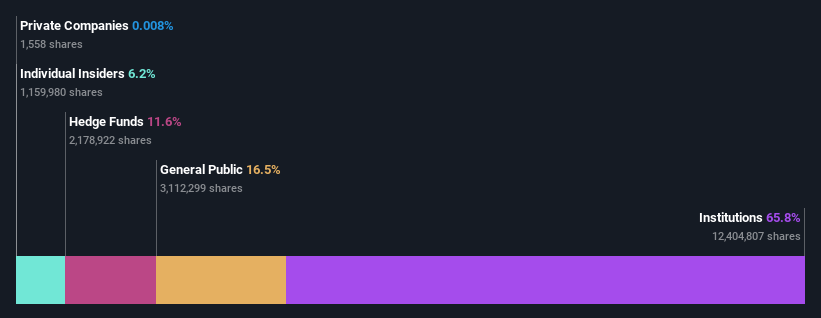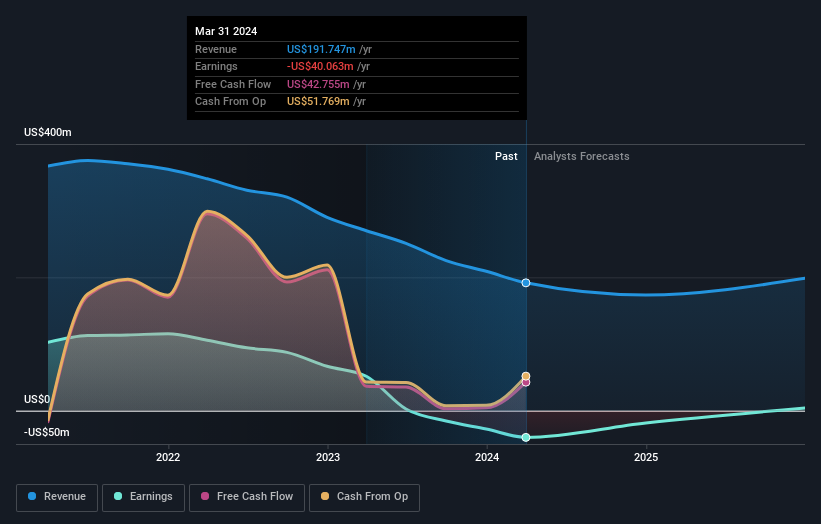- United States
- /
- Banks
- /
- NasdaqGS:HMST
With 66% ownership in HomeStreet, Inc. (NASDAQ:HMST), institutional investors have a lot riding on the business

Key Insights
- Given the large stake in the stock by institutions, HomeStreet's stock price might be vulnerable to their trading decisions
- The top 15 shareholders own 51% of the company
- Using data from analyst forecasts alongside ownership research, one can better assess the future performance of a company
If you want to know who really controls HomeStreet, Inc. (NASDAQ:HMST), then you'll have to look at the makeup of its share registry. We can see that institutions own the lion's share in the company with 66% ownership. Put another way, the group faces the maximum upside potential (or downside risk).
Last week’s 25% gain means that institutional investors were on the positive end of the spectrum even as the company has shown strong longer-term trends. The gains from last week would have further boosted the one-year return to shareholders which currently stand at 72%.
Let's delve deeper into each type of owner of HomeStreet, beginning with the chart below.
View our latest analysis for HomeStreet

What Does The Institutional Ownership Tell Us About HomeStreet?
Many institutions measure their performance against an index that approximates the local market. So they usually pay more attention to companies that are included in major indices.
We can see that HomeStreet does have institutional investors; and they hold a good portion of the company's stock. This suggests some credibility amongst professional investors. But we can't rely on that fact alone since institutions make bad investments sometimes, just like everyone does. If multiple institutions change their view on a stock at the same time, you could see the share price drop fast. It's therefore worth looking at HomeStreet's earnings history below. Of course, the future is what really matters.

Investors should note that institutions actually own more than half the company, so they can collectively wield significant power. It looks like hedge funds own 12% of HomeStreet shares. That's interesting, because hedge funds can be quite active and activist. Many look for medium term catalysts that will drive the share price higher. Looking at our data, we can see that the largest shareholder is BlackRock, Inc. with 6.8% of shares outstanding. With 5.9% and 5.7% of the shares outstanding respectively, Philadelphia Financial Management of San Francisco, LLC and Maltese Capital Management, LLC are the second and third largest shareholders. Additionally, the company's CEO Mark Mason directly holds 1.0% of the total shares outstanding.
After doing some more digging, we found that the top 15 have the combined ownership of 51% in the company, suggesting that no single shareholder has significant control over the company.
While it makes sense to study institutional ownership data for a company, it also makes sense to study analyst sentiments to know which way the wind is blowing. There are a reasonable number of analysts covering the stock, so it might be useful to find out their aggregate view on the future.
Insider Ownership Of HomeStreet
The definition of an insider can differ slightly between different countries, but members of the board of directors always count. Management ultimately answers to the board. However, it is not uncommon for managers to be executive board members, especially if they are a founder or the CEO.
Most consider insider ownership a positive because it can indicate the board is well aligned with other shareholders. However, on some occasions too much power is concentrated within this group.
We can see that insiders own shares in HomeStreet, Inc.. In their own names, insiders own US$12m worth of stock in the US$198m company. Some would say this shows alignment of interests between shareholders and the board, though we generally prefer to see bigger insider holdings. But it might be worth checking if those insiders have been selling.
General Public Ownership
With a 17% ownership, the general public, mostly comprising of individual investors, have some degree of sway over HomeStreet. This size of ownership, while considerable, may not be enough to change company policy if the decision is not in sync with other large shareholders.
Next Steps:
While it is well worth considering the different groups that own a company, there are other factors that are even more important.
Many find it useful to take an in depth look at how a company has performed in the past. You can access this detailed graph of past earnings, revenue and cash flow.
But ultimately it is the future, not the past, that will determine how well the owners of this business will do. Therefore we think it advisable to take a look at this free report showing whether analysts are predicting a brighter future.
NB: Figures in this article are calculated using data from the last twelve months, which refer to the 12-month period ending on the last date of the month the financial statement is dated. This may not be consistent with full year annual report figures.
Valuation is complex, but we're here to simplify it.
Discover if HomeStreet might be undervalued or overvalued with our detailed analysis, featuring fair value estimates, potential risks, dividends, insider trades, and its financial condition.
Access Free AnalysisHave feedback on this article? Concerned about the content? Get in touch with us directly. Alternatively, email editorial-team (at) simplywallst.com.
This article by Simply Wall St is general in nature. We provide commentary based on historical data and analyst forecasts only using an unbiased methodology and our articles are not intended to be financial advice. It does not constitute a recommendation to buy or sell any stock, and does not take account of your objectives, or your financial situation. We aim to bring you long-term focused analysis driven by fundamental data. Note that our analysis may not factor in the latest price-sensitive company announcements or qualitative material. Simply Wall St has no position in any stocks mentioned.
Have feedback on this article? Concerned about the content? Get in touch with us directly. Alternatively, email editorial-team@simplywallst.com
About NasdaqGS:HMST
HomeStreet
Operates as the bank holding company for HomeStreet Bank that provides commercial, mortgage, and consumer/retail banking services in the Western United States.
Excellent balance sheet with reasonable growth potential.


